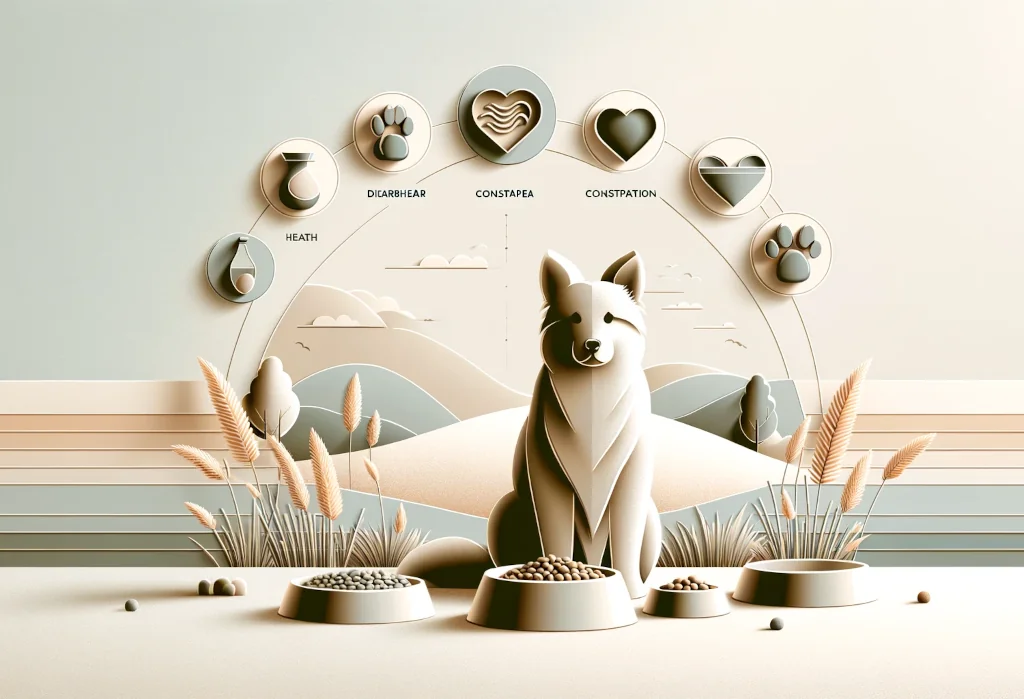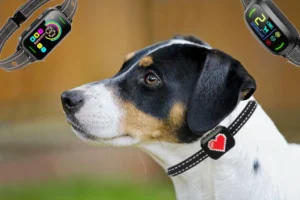When your four-legged companion starts doing the bathroom dance more often than the tail-wagging one, it’s a barking sign that something’s up. And when the scooting starts, it’s not just your carpet that’s in trouble.
In this post, you’ll get an easily digestible (pun intended) guide to understanding and managing your dog’s digestive issues, focusing on the troublesome duo of diarrhea and constipation.
Key takeaways:
- Swiftly address diarrhea lasting over 48 hours or constipation beyond 72 hours to prevent complications.
- Monitor hydration carefully, especially during episodes of diarrhea, using the skin-tent test and checking gum color.
- Incorporate pure pumpkin into your dog’s diet for an easy, natural aid in managing both diarrhea and constipation.
What’s Upset My Dog’s Stomach?
When your pup’s tummy is in turmoil, it can be a stressful time for both of you. The causes of digestive issues in dogs are as varied as the breeds themselves, but let’s break down the most common culprits. An abrupt change in diet is a frequent offender.
Our four-legged friends can have sensitive stomachs, and swapping out their food without a gradual transition is a recipe for trouble. Another common cause? Dietary indiscretions – or, in layman’s terms, your dog eating something they shouldn’t. This can range from scarfing down a chocolate bar (a definite no-no) to gobbling up garbage.
Stress, infections, parasites, and ingesting foreign objects can also lead to significant tummy troubles. Each of these factors disrupts the delicate balance of your dog’s digestive system, leading to discomfort, and sometimes, more serious conditions. Understanding these triggers can help you keep an eye out for potential hazards and make more informed decisions about your pet’s care and environment.
Signs and Symptoms to Watch Out For
Early detection can be the key to managing digestive issues effectively. Here are some signs that your dog might be suffering from either diarrhea or constipation:
- Diarrhea: Look for frequent loose or liquid bowel movements. You might also notice an increase in the urge to go, accompanied by a sense of urgency.
- Constipation: This is characterized by infrequent, difficult, or seemingly painful attempts to defecate. Watch for straining or discomfort during bathroom trips.
Apart from these, lethargy, loss of appetite, and noticeable changes in behavior could indicate discomfort or pain. A bloated abdomen or excessive gas might also be present. If your dog starts exhibiting any of these symptoms, it’s essential to pay attention and consider reaching out to a veterinarian.
How Can You Support Your Dog’s Digestive Health?
A happy dog starts with a healthy gut. Here are some tips to help you support your dog’s digestive health effectively:
Dietary Habits
A balanced diet customized to your dog’s age, size, and activity level plays a crucial role in maintaining digestive health. Incorporate easily digestible proteins and ensure the food is of high quality. For dogs with sensitive stomachs, consider foods specially formulated for digestive health that contain probiotics or prebiotics. One unique tip is to add a spoonful of pure pumpkin (not pumpkin pie filling) to your dog’s food. The fiber in pumpkin can aid in both diarrhea and constipation, offering a simple, natural remedy for minor digestive troubles.
Hydration and Exercise
Never underestimate the power of water and regular physical activity. Ensure your dog has access to clean water at all times, as proper hydration is essential for healthy digestion. Similarly, regular, moderate exercise can help stimulate the digestive system, keeping things flowing smoothly.
Routine and Monitoring
Establishing a consistent feeding routine can help prevent digestive issues by providing a sense of security and stability for your dog’s digestive system. Additionally, keep an eye on your dog’s bathroom habits and stool quality. Changes in these areas can be early indicators of digestive issues, so prompt attention can make all the difference.
In conclusion, while digestive issues like diarrhea and constipation can be concerning, understanding the potential causes and recognizing the signs early on can go a long way toward keeping your dog healthy and comfortable. Remember, when in doubt, a veterinarian’s advice is invaluable for ensuring the well-being of your furry friend. This is just the beginning of our journey toward understanding and supporting our dogs’ digestive health, so stay tuned for more insights and tips.
When Is It Time to Visit the Vet?
As loving pet parents, we all want our dogs to be healthy and happy. Yet, digestive issues like diarrhea and constipation can sometimes throw a wrench into our furry friends’ well-being. It’s not always clear-cut when these issues warrant a trip to the vet, but fear not! Let’s chew over the scenarios that signal it’s time to get professional help, offering you peace of mind and your pooch the relief they need.
Prolonged Symptoms: The First Red Flag
The occasional upset stomach is not unusual for dogs, thanks to their curious nature and, let’s face it, sometimes indiscriminate eating habits. However, when diarrhea or constipation stretches beyond a couple of days, it’s time to sit up and take notice. Specifically:
- Diarrhea lasting more than 48 hours
- Constipation that doesn’t resolve in 48 to 72 hours
Dehydration: A Sneaky Culprit
With diarrhea, dehydration can creep up on your dog, leading to more serious complications. Keep an eye out for signs like dry gums, lethargy, or decreased skin elasticity. A simple skin-tent test—gently pinching the skin at the back of your dog’s neck—can give you a quick, albeit rough, idea of their hydration level. If the skin doesn’t snap back quickly, your dog could be dehydrated and in need of veterinary intervention.
Pain and Discomfort
Nobody knows your dog better than you do. If they’re showing signs of pain—whining more than usual, being overly sensitive to touch especially near their tummy, or exhibiting any unusual behavior—it’s a clear signal that something’s not right. Pain could indicate anything from a blockage needing urgent attention to something as manageable as gas pain, but only a vet can diagnose the cause accurately.
Unusual Symptoms That Often Go Unnoticed
Some symptoms might not scream “digestive issues” at first glance but warrant a second look. Unexplained weight loss, for instance, can be a puzzle piece in the larger picture of your dog’s health. Similarly, an uncharacteristic change in appetite or a sudden pickiness about food might be your dog trying to tell you something’s up.
The Unique Insight: Gut Feelings and Gum Checks
Here’s a piece of advice you might not find in every blog: trust your gut. You’re attuned to your pet’s norms, and if something feels off, it probably is. Pair this intuition with a simple but effective check—a look at your dog’s gums. Pale or overly red gums can indicate dehydration and other issues needing a vet’s eye. Remember, you’re not overacting by opting for a professional opinion; you’re being a responsible pet owner.
Wrapping Up
Caring for a dog with digestive problems can feel like navigating a maze without a map. But knowing when to seek professional help demystifies this journey significantly. Always lean on the side of caution and, when in doubt, consult your vet. They’re your best ally in ensuring your dog’s tail keeps wagging happily and healthily.
Whether it’s prolonged symptoms, signs of dehydration, or an instinct that something’s just not right, your timely response can make all the difference. Your dog gives you their best every day; returning the favor means keeping a vigilant eye on their health, armed with knowledge and love.
Alex, a passionate animal lover, has experience in training and understanding animal behavior. As a proud pet parent to two dogs and three cats, he founded AnimalReport.net to share insights from animal experts and expand his knowledge of the animal kingdom.





